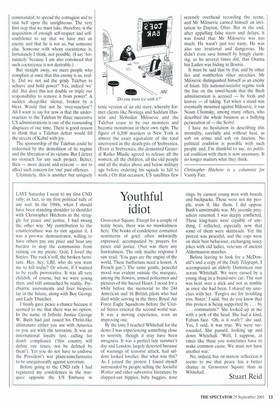Youthful idiot
LAST Saturday I went to my first CND rally; in fact, to my first political rally of any sort. In the 1960s, when I should have been standing shoulder to shoulder with Christopher Hitchens in the struggle for peace and justice, I had swung the other way. My contribution to the counterculture was to riot against it. I was a pro-war demonstrator, willing to have others pay any price and bear any burden to stop the communists from raining on my picnic. God, I loved the Sixties. The rock'n'roll, the broken furniture. Hey. hey, LBJ, who do you want me to kill today? Or whom, if I wanted to be really provocative. It was all very childish, of course, but we were young then, and still untouched by reality. Psychiatric assessments and liver biopsies lay in the future, along with Boy George and Lady Thatcher.
I finally gave peace a chance because it seemed to me that there was no option. In the name of Infinite Justice George W. Bush had just issued his Christ-like ultimatum: either you are with America or you are with the terrorists. It was an international loyalty test, calling for dumb compliance (this country will define our times, not be defined by them'). Yet you do not have to endorse the President's war plans/aims/fantasies to be unequivocally against terrorism.
Before going to the CND rally I had registered my condolences in the marquee opposite the US Embassy in
Grosvenor Square. Except for a couple of teddy bears, there was no mawkishness here. The books of condolence contained sentiments of grief, often awkwardly expressed, accompanied by prayers for peace and justice. (Nor was there any hawkishness. The only macho response I saw read: 'You guys are the engine of the world. These barbarians need a lesson. A French guy.') The same gentle, peaceful mood was evident outside the marquee, among the flowers, armed policemen and pictures of the Sacred Heart. I stood for a while before the memorial to the 244 American and 16 British pilots who had died while serving in the three Royal Air Force Eagle Squadrons before the United States entered the second world war. It was a moving experience, even an improving one.
By the time I reached Whitehall for the demo I was experiencing something close to serenity, though it may have been smugness. It was a perfect late summer's day and London, largely deserted because of warnings of terrorist attack, had seldom looked lovelier. But what was this? As I joined the protest I found myself surrounded by people selling the Socialist Worker and other subversive literature; by clapped-out hippies, baby buggies, nose
rings; by earnest young men with beards and backpacks. These were not my people, even if, like them, I did oppose Bush's unwinnable war. My juvenile prejudices returned. I was deeply conflicted. These long-hairs were capable of anything, I reflected, especially now that some of them were skinheads. Yet the protest was peaceful, and the cops were on their best behaviour, exchanging saucy jokes with old ladies, veterans of ancient Aldermaston marches.
Before leaving to look for a McDonald's and a copy of the Daily Telegraph, I accompanied an elderly Dominican nun across Whitehall. We were cursed by a young thug in a brand-new car, The nun was bent over a stick and not as nimble as once she had been. I shared my anxieties with her. 'Forgive me for troubling you, Sister,' I said, 'but do you know that this protest is being supported by . by . . . communists?' She looked up at me with a jerk of the head. She had a kind, Fabian face. 'Oh, is it really?' she said. Yes, I said, it was true. We were surrounded. She paused, looking up and down Whitehall. 'Well, I suppose, at times like these you sometimes have to make common cause. We must not have another war.'
No, indeed, but on mature reflection it seems to me that peace has a better chance in Grosvenor Square than in
Whitehall. Stuart Reid






































































 Previous page
Previous page